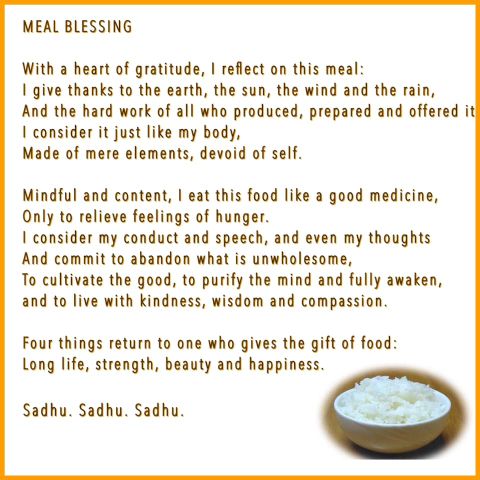Meal Blessings
| I am grateful for this food -- The work of many hands, The result of innumerable labors, And the sharing of other forms of life. |
|
Earth, air,water, fire, and space combine to make this food Numberless beings give their lives and labor that we may eat May we be nourished so that we may nourish life. |
|
With a heart of gratitude, I reflect on this meal: I give thanks to the earth, the sun, the wind and the rain, And the hard work of all who produced, prepared and offered it. I consider it just like my body, Made of mere elements, devoid of self. Mindful and content, I eat this food like a good medicine, Only to relieve feelings of hunger. I consider my conduct and speech, and even my thoughts And commit to abandon what is unwholesome, To cultivate the good, to purify the mind and fully awaken, and to live with kindness, wisdom and compassion. Four things return to one who gives the gift of food: Long life, strength, beauty and happiness. |
|
Reflecting wisely, I use this food, not playfully, nor for intoxication, not for fattening, nor for beautification; but simply for the survival & continuance of this body, for ending its afflictions, for the support of the holy life, thinking, 'Thus will I destroy old feelings [of hunger] and not create new feelings [from overeating]. I will maintain myself, be blameless, & live in comfort.' |


|
From https://en.wikipedia.org/wiki/Itadakimasu:
Often said before eating a meal, the phrase is used as a way of showing gratitude and respect for everyone and everything that made the meal in front of you possible. It is meant to honor all: from the natural elements that supplied the ingredients, the people who grew the produce, to the ones who prepared and cooked the meal, etc In this etiquette rule book, there reads a passage which translates to "When I pick up the chopsticks, I receive the blessings of the heavens and earth, and the blessings of my lord, my lord, and my parents".[1] To summarize, the text implies that before eating, you should take a moment to honor and appreciate what you have; all nature, animals, the emperor, and your parents. When the book was released to the public (popularized during the ShÍwa period), the habit of saying itadakimasu before meals was heavily encouraged by the JÍdo-Shinshū sect of Buddhism, slowly leading to the integration of the phrase into daily life and the cultural prominence it has today. As this word is taught at a young age in Japanese culture, the Japanese believe that it influences their children's emotional development by educating that the words they use have a larger emotional meaning to them, and that there is a reason to put your feelings into them |